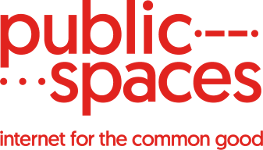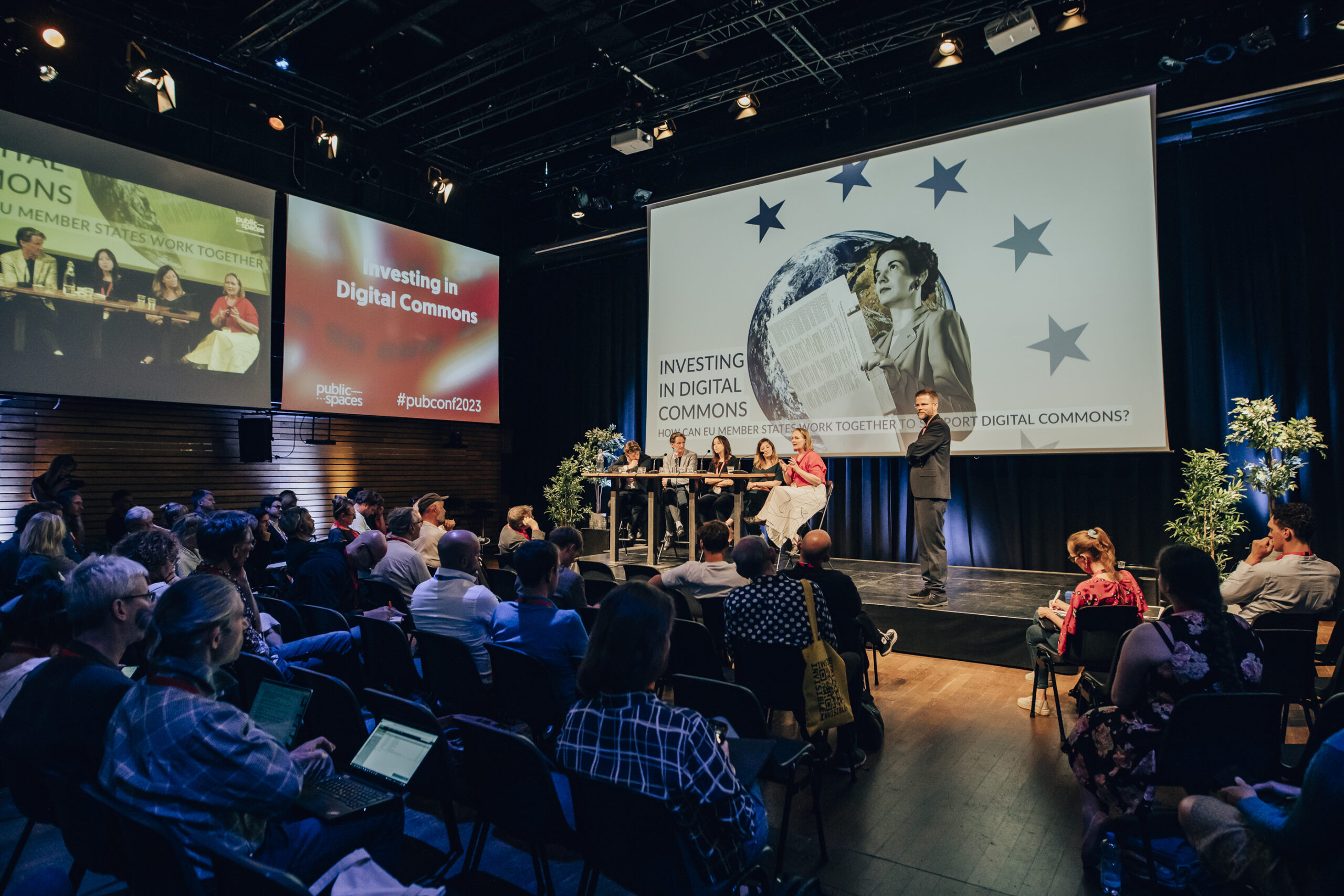This session is in English 🇬🇧
First breakout of track 3 Meet the disruptors
Silicon Valley, and the world of venture capital revolve around the notion of radical disruption. Those ideas that change the world instantaneously. The question: ‘what comes after the break?’ is deliberately postponed until a later date. First innovate, then improve is the device.
In order to move towards a better internet, incremental change is not enough. In fact, it may actually be the mentality of ‘ship first, fix later’ that may have led to the problems that we are currently facing.
In this track, we want to highlight the trailblazers that aim to create a different form of disruption. People that do not only want to change the world for a moment, but those that have the stamina and patience to persist.
Take Away:
Exploring what disruption truly means (innovation, mobilization, and organization) and create awareness of the fact that not all radical changes are equal when viewed from a PublicSpaces perspective.
Breakout 1: Failed Encounters
The problems and questions that PublicSpaces poses aren’t new. In fact, they were part of the narrative of the internet from the very beginning. In this first breakout session, we will focus on people from different epochs of this narrative and highlight their stories.
However, it’s important to realize that we would not be here today if their stories only consisted of successes. Looking back, most of these attempts actually failed. Let’s learn from them to prevent making the same mistakes again.
Format: presentations & short interview by moderator followed by questions from colleagues and audience
Moderator
Speakers
- Bill Thompson (BBC)
- Marleen Stikker (Waag)
- Amandine Le Pape (Matrix)
Main take aways
- All the warning signs were there, but the government public organizations didn't listen and still thought that the internet was anarchy. So we need to demystify the technology, and that is happening now. This is where the space to redesign the technology starts to grow.
- The way that it is currently going, it is unlikely that we can get the right outcomes without doing something now. This is the moment to discuss what the technical solutions to get the right societal outcomes would look like, in order to inform the regulation. We need the combination of political engagement and technical engagement to build stuff that works and the community that wants the outcomes. People need to believe that what we're building is good for them.
- The pendulum is definitely moving in the right direction; from complete open communities to locked-in silos, back to a more open infrastructure.
Recap
Bill about his trajectory from the last years with regards to public spaces: he is a senior researcher at research and development at BBC and he has a background in philosophy and programming. He was responsible for the UK government's first website. His main theme: the internet has the affordance to be a force for good in society, but only when we make it a force for good. Fundamentally, if we want to change the way we interact on the network, we need to change the code. The idea of digital public space was already a bit a part of the presence of BBC on the internet at the beginning of the internet. But it wasn't pushed enough, and he regrets that a bit. He used to think that the technology that facilitates communication also facilitates community. But this community is distorted. He didn't think about what needed to be safeguarded, because it was hard to predict how it would be misused because they trusted the community. So there were a lot of things that weren't thought through.
Marleen about her trajectory from the last years with regards to the public spaces: her entire "pioneer" role is about building public spaces, that was the Digital City in 1994. Something happened between then and now, and now they are trying to fix that. She is connected to the digital media movement. Technical media was in the news a lot because of pirate radios and a strong hacker community. Together with artists and designers, they claimed a "part of the internet": a server that turned into the digital city. All the discussions that are being held now, were also part of the discussion then. The digital city declined and the social platforms were monetized. The social medial platforms from now were built on the principles from the designers/hackers communities. A large reason for the decline of the digital city is the economic environment: the digital space was seen as private space. It was a pity that a divide grew between the digital city and another organization, which made the digital city decline. Public organizations (such as broadcasters) didn't step up and lost their influence on the internet – also due to the government holding them back. The last thing: the internet is an open protocol, and a lot of things such as identity management and encryption was flawed. But what we didn't have was an open protocol to exchange between messaging spaces. The way data and communities were managed was not open, but that is changing now.
Amandine: they are working on an open layer on the internet. They have been working together for almost 20 years building messaging apps, but they were always working with the existing building blocks. These blocks were lacking because the people are locked in a silo, the data is misused. And you should be free to choose which platform you want to use, rather than being forced into an app because the community is using it. However, trying to create open messaging apps is much harder and takes a lot more time because you cannot use those building blocks, so it's also understandable. The thing she regrets the most is not being able to do it faster, they are behind on the game. There were a lot of hurdles and difficulties that made that they were much slower than expected. There is not one good and one bad: the freedom fighters of one side are the terrorists of the other. So with Matrix, they want to at least create a platform that is open and different values can coexist.
"There is not one good and one bad: the freedom fighters of one side are the terrorists of the other. So with Matrix, we want to at least create a platform that is open and where different values can coexist."
Amandine le Pape
In discussion together:
In the early days, were there structural things that were missing that would have made it possible to maintain that what you are now trying to repair?
Amandine: it was necessary for us to be able to learn from other people's mistakes.
Marleen: the beginning of the internet was such a rich place for new formats, but the neoliberal climate did not encourage this. So the economy of privatization and "making your own money" ruined that. So the understanding that the commons and open protocols are a necessity is fundamental. This knowledge is a game-changer and that would have helped a lot if that existed back then.
Bill agrees with this and he says how there was a lot of knowledge missing regarding connections between technology and psychology, and the people building it didn't do the reading and research. Rather, they were running and didn't take the time to reflect and think about what they were building and how it would influence society.
Jan Hein: there was a misunderstanding that the choices you make in the foundations don't influence the higher levels in the stack.
Amandine: I agree, you really need to think about what you are using but it is important to first think about what you want to achieve and then later find the tool that helps you to get to that goal.
Marleen: all the warning signs were there, but the government public organizations didn't listen and still thought that the internet was anarchy. So we need to demystify the technology, and that is happening now. This is where the space to redesign the technology starts to grow.
Bill: many of the solutions we see come from the big platform companies. Will there be space for the world we are imagining around the public table when the money is still stuck in these big companies?
Marleen: yes, so we need economic reform. We need to reclaim and rethink economics. We need to think about what shared responsibility and shared resources are. If people start to understand how these open models work, people can join and help build alternatives.
Element is monetizing and promoting the Matrix app which is actually an ecosystem. Element is just one company that makes a profit from Matrix, and it is open for other companies to build upon Matrix. The same way the world wide web is an ecosystem that a lot of companies can build upon and profit from.
Bill: so that is very admirable because they have tried to fix the mistakes that were made before.
Marleen: we also have to regulate that what has happened in the past cannot happen anymore. We must make sure personal data cannot be used anymore for profit.
Marleen: question to Amandine and Bill: how do you see the coming 5 years?
Bill: there is no more time. The way that it is currently going, it is unlikely that we can get the right outcomes without doing something now. This is the moment to discuss what the technical solutions to get the right societal outcomes would look like, in order to inform the regulation. We need the combination of political engagement and technical engagement to build stuff that works and the community that wants the outcomes. People need to believe that what we're building is good for them.
Amandine: I agree, there is definitely growth in awareness, it's going in the right direction. In regards to changing the entire industry, 5 years is a bit short. 10 years is more likely. But the pendulum is definitely moving in the right direction; from complete open communities to locked-in silos, back to a more open infrastructure.
The money was donated to Women Who Code.
Evenement tijdschema's (1)
Track 3
-
🇬🇧


Geef een reactie